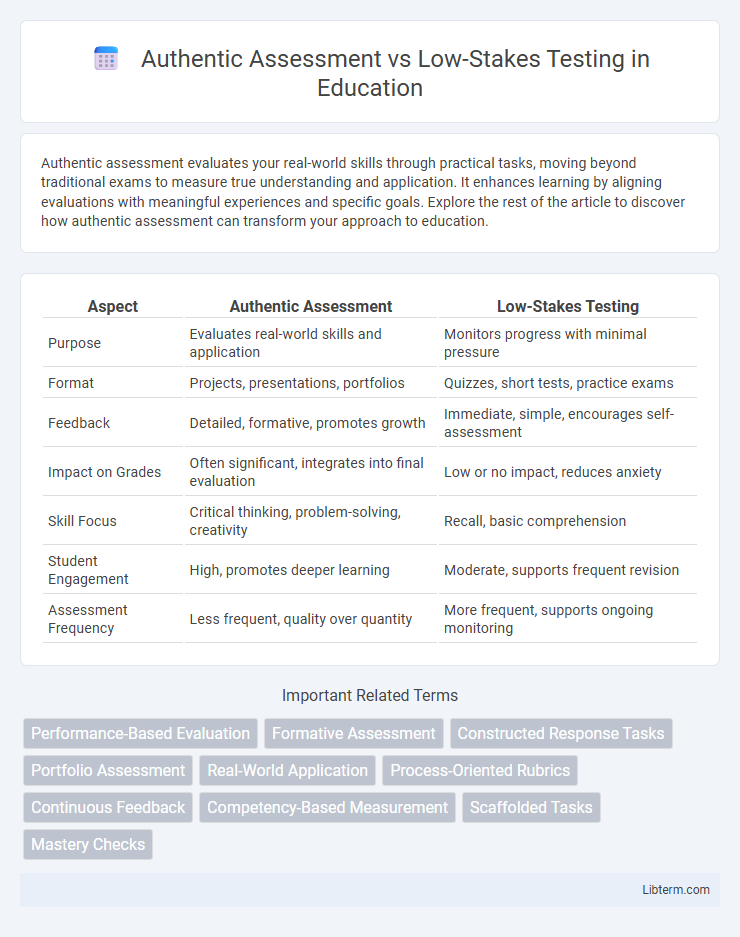Authentic assessment evaluates your real-world skills through practical tasks, moving beyond traditional exams to measure true understanding and application. It enhances learning by aligning evaluations with meaningful experiences and specific goals. Explore the rest of the article to discover how authentic assessment can transform your approach to education.
Table of Comparison
| Aspect | Authentic Assessment | Low-Stakes Testing |
|---|---|---|
| Purpose | Evaluates real-world skills and application | Monitors progress with minimal pressure |
| Format | Projects, presentations, portfolios | Quizzes, short tests, practice exams |
| Feedback | Detailed, formative, promotes growth | Immediate, simple, encourages self-assessment |
| Impact on Grades | Often significant, integrates into final evaluation | Low or no impact, reduces anxiety |
| Skill Focus | Critical thinking, problem-solving, creativity | Recall, basic comprehension |
| Student Engagement | High, promotes deeper learning | Moderate, supports frequent revision |
| Assessment Frequency | Less frequent, quality over quantity | More frequent, supports ongoing monitoring |
Understanding Authentic Assessment
Authentic assessment evaluates students through real-world tasks that demonstrate their ability to apply knowledge and skills in practical contexts. This method emphasizes critical thinking, problem-solving, and the integration of learning with real-life scenarios, fostering deeper comprehension. Unlike low-stakes testing, authentic assessment provides meaningful feedback and encourages continuous improvement through performance-based evaluation.
Defining Low-Stakes Testing
Low-stakes testing refers to assessments designed to minimize pressure on students by having little or no impact on final grades or academic progression. These tests emphasize formative feedback, enabling educators to gauge learning progress without high consequences. Incorporating low-stakes testing supports a supportive learning environment that fosters continuous improvement and reduces test anxiety.
Key Objectives of Both Assessment Types
Authentic assessment aims to evaluate students' real-world skills and knowledge through complex tasks that replicate professional or everyday challenges, emphasizing critical thinking, problem-solving, and application of concepts. Low-stakes testing primarily focuses on frequent, low-pressure evaluations designed to monitor learning progress, reduce anxiety, and provide ongoing feedback for both students and educators. Both assessment types seek to enhance learning outcomes, with authentic assessment driving deeper understanding and skill development, while low-stakes testing supports consistent performance tracking and skill reinforcement.
Real-World Applications and Relevance
Authentic assessment emphasizes real-world applications by engaging students in tasks that mirror professional and everyday challenges, ensuring deeper understanding and practical skills development. Low-stakes testing, often characterized by frequent, low-pressure quizzes, primarily measures retention and comprehension with limited connection to real-life scenarios. Incorporating authentic assessment fosters relevance and meaningful learning, enhancing students' ability to transfer knowledge to practical contexts.
Student Engagement and Motivation
Authentic assessment enhances student engagement and motivation by linking tasks to real-world applications, fostering deeper understanding and intrinsic interest. Low-stakes testing reduces anxiety and pressure, encouraging consistent effort without fear of failure, which can sustain motivation over time. Both approaches impact student engagement differently, with authentic assessments promoting meaningful learning and low-stakes tests supporting ongoing self-assessment.
Measuring Higher-Order Thinking Skills
Authentic assessment effectively measures higher-order thinking skills by requiring students to apply, analyze, and synthesize information through real-world tasks and projects. Low-stakes testing, while useful for frequent feedback, often focuses on rote memorization and basic comprehension, limiting its ability to gauge complex cognitive processes. Emphasizing authentic tasks promotes critical thinking and deeper learning, essential for mastering advanced academic concepts and problem-solving.
Feedback: Timeliness and Effectiveness
Authentic assessment provides timely, specific feedback that supports deeper learning by connecting tasks to real-world skills, enhancing student engagement and self-reflection. Low-stakes testing typically offers rapid, aggregated feedback, which aids in identifying knowledge gaps but may lack nuanced insights for individual growth. Effective feedback in authentic assessments drives meaningful improvement, while timely responses in low-stakes tests help reinforce concepts and reduce test anxiety.
Equity and Inclusivity in Assessment
Authentic assessment promotes equity and inclusivity by evaluating students through real-world tasks that reflect diverse abilities and cultural backgrounds, reducing biases inherent in standardized low-stakes tests. Unlike low-stakes testing, which often overlooks individual learning contexts, authentic assessments provide multiple ways for students to demonstrate knowledge, supporting varied learning styles and fostering a more inclusive environment. Emphasizing authentic assessment helps educators identify unique strengths and challenges, creating fairer opportunities for all students to succeed.
Advantages and Limitations
Authentic assessment offers a comprehensive evaluation of student skills by simulating real-world tasks, promoting critical thinking and deeper learning, but it can be time-consuming to design and grade consistently. Low-stakes testing reduces anxiety and encourages frequent practice, improving retention and providing immediate feedback, though it may not fully capture complex problem-solving abilities or long-term understanding. Balancing both methods enables educators to assess diverse competencies while managing workload and student stress efficiently.
Choosing the Right Assessment for Learning Outcomes
Authentic assessment emphasizes real-world tasks that align closely with learning objectives, promoting deeper understanding and skill application. Low-stakes testing provides frequent, low-pressure evaluations that support knowledge retention and reduce test anxiety, facilitating continuous learning feedback. Selecting the appropriate assessment hinges on desired outcomes, where authentic assessments suit complex skill mastery and low-stakes tests optimize formative progress monitoring.
Authentic Assessment Infographic

 libterm.com
libterm.com